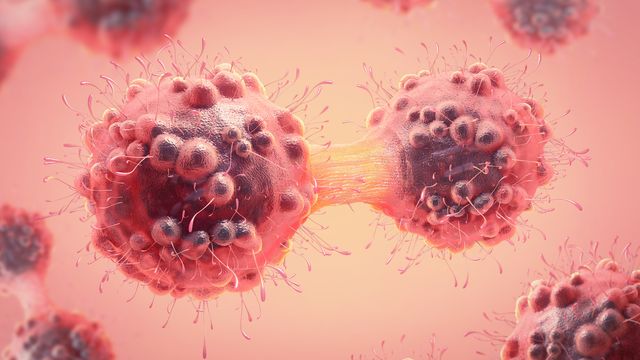Trending News
News

News
Cell Division Enzyme Identified as Possible Cancer Treatment Target
Researchers studying how cancer cells divide have revealed potential new viable therapeutic targets for cancer treatment.

News
Less-Invasive Treatments Developed for Head and Neck Cancers
A combined radiotherapy and immunotherapy treatment before surgery offers a less invasive treatment strategy for head and neck cancers that usually don't respond well to immunotherapy.

News
Rogue Immune Cells Linked to Leukaemia Are a Key Driver of Autoimmune Diseases
Scientists have pinpointed rogue immune cells as a major contributor to autoimmune conditions like rheumatoid arthritis and aplastic anaemia.

News
New Technique Zaps Brain Cancer Cells in Lab Model
A novel method to treat brain cancer that doesn't involve heat, radiation or opening the skull has been developed by researchers at the University of Saskatchewan.

News
Existing Drugs Show Promise as Kidney Cancer Treatment
Researchers have discovered a potential drug target to treat renal cell carcinoma.

News
Nanoparticles Co-Deliver Chemotherapy and Immunotherapy To Shrink Tumors in Mice
Researchers have designed cancer-fighting nanoparticles that deliver both a chemotherapy drug and a novel immunotherapy that can shrink colon and pancreatic tumors in mice.

News
Biomarker Predicts Resistance to Immunotherapies in Melanoma
Duke Cancer Institute researchers have identified potential biomarkers that predict the likelihood for checkpoint inhibitor drugs to backfire, driving hyper-progression of melanoma cells instead of unleashing the immune system to fight them.

News
Drug Compound Stimulates Immune Cells To Attack Prostate Cancer
According to a study, a single drug compound can help immune cells penetrate tumors, and cut off the tumor’s ability to burn testosterone as fuel in prostate cancer.

News
MicroRNAs Can Help Predict Disease Recurrence in Breast Cancer Patients
University of Galway researchers discover biomarkers that may help in determining tailored cancer treatment.

News
Discovery Could Lead to New Drugs Against Bowel Cancer Protein
New structural insights into the tankyrase protein, which plays a key role in driving bowel cancer development, could pave the way towards better and less toxic cancer drugs.
Advertisement




